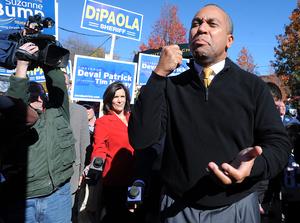
After nearly two years of hard campaigning on both sides, the 2010 election season finally came to a resounding close on November 2, catapulting Republicans into control of the House of Representatives, and significantly reducing Democrats’ influence in the US Senate. But in Massachusetts, months after Republican Scott Brown shocked the political world by winning the US Senate seat formerly held by Ted Kennedy, Democrats swept every Congressional race and maintained control over every state constitutional office. Republicans even lost one seat in the State Senate, increasing the Democratic Party’s longstanding super-majority in that body.
Surprisingly, political races across the country that were previously considered highly competitive were decided faster than expected, and Democratic senators like Harry Reid and Barbara Boxer, long considered the scourge of the Republican Party, attained wider margins of victory than expected to keep their seats. For months, political pundits had been discussing heavy opposition to the policies of the Democrat-controlled Congress and White House, but ultimately only two incumbent Democratic senators were voted out of office. Although President Obama will now have to work with a House of Representatives controlled by Republicans, his party’s hold on the Senate remains firm. Furthermore, as with President Clinton in 1996, two years after his party lost control of the House, political analysts are already speculating that the GOP’s victories in the House could actually brighten Obama’s re-election prospects in 2012. With a government divided by the two political parties, there will be more opportunity for Obama to highlight the failures of the Republican Party. Nevertheless, Republicans claim they won control of the House this year due in part to heavy dissatisfaction with Democrats, an indication of possible troubles for Democratic prospects in the years to come.
In Massachusetts, Senator Scott Brown appears to be the only Republican elected statewide in Massachusetts during the year 2010. Republicans had hoped to put members of their party in the State Treasurer’s office, the Auditor’s office, the Governor’s office, and into many other offices statewide. Polls showed a number of tight races for Congress in this state, including Barney’s Frank’s coveted seat in the 4th District, and Bill Delahunt’s seat in the 10th Congressional District. But Democrats maintained their hold on these offices, thanks to aggressive get-out-the-vote campaigns that aggressively brought people to the polls. Republicans also hoped to take over the governor’s office, and were viewing Governor Patrick’s low poll numbers in recent years as a sign of Patrick’s vulnerabilities. But Patrick proved to be a strong campaigner, matched against Republican candidate Charlie Baker who many felt was a better business executive than political campaigner. Baker’s campaign fell short of its expectations, coming up six percentage points behind Governor Patrick in the final vote count. Patrick’s strong support in the state’s major cities, like Boston, Springfield, Lowell, New Bedford, Worcester, and Fall River put him over the top, even though Baker won the vast majority of the state’s suburbs. Baker did very strongly in southern Massachusetts and along the South Coast, and took wins in Attleboro and Plymouth, although he lost most of the communities in western and central Massachusetts. Baker’s losses in western Massachusetts can be attributed to Patrick’s strong connections to the western rural communities – besides having a vacation home in the Berkshires, Patrick maintains a governor’s satellite office in Springfield and also campaigned there more aggressively than Baker did.
In Walpole, a Republican stronghold that voted for Republican Kerry Healey in the 2006 governor’s race and for John McCain in the 2008 presidential election, Baker got 56% of the vote to Patrick’s 35%. Baker won in towns around Walpole, as well, except Sharon, which voted for Patrick 56% to 38%. Other Republicans did well in Walpole too, including Jim Stanton, an East Walpole Republican who was vying to knock incumbent Democrat State Representative John Rogers out of office. Stanton performed well in Walpole, but the district includes all of Norwood, which is Rogers’ hometown, and his base of support. Rogers walked away with the win because the Norwood votes put him over the top, but Stanton vowed to run again in a rematch for the seat in 2012. Karyn Polito, Republican candidate for State Treasurer, also won in Walpole, but lost the race statewide. A similar outcome occurred with Mary Z. Connaughton, Republican candidate for State Auditor, who won Walpole by nearly 30 percentage points over her Democratic challenger, Suzanne Bump. But Walpole voted Democrat in two statewide races, voting overwhelmingly to re-elect Martha Coakley Attorney General and also to re-elect Secretary of State Bill Galvin. Coakley’s opponent, Jim McKenna, was placed on the ballot after waging a successful write-in campaign in the Republican primary in September. State Republicans, knowing Coakley was bruised after losing the Senate Special Election to Brown in January, were hoping to defeat Coakley again, but McKenna only ended up carrying a few small towns across the Commonwealth, including Dover, Norfolk, and Wrentham. In the race for Norfolk County District Attorney, Michael Morrissey emerged victorious countywide, but lost a few towns to his independent opponent Jack Coffey. Morrissey’s hometown of Quincy fell overwhelmingly for Morrissey, but Coffey won his hometown of Needham as well as Walpole, Norfolk, Dover, Medfield, and Medway. Coffey has not said yet whether he will run again for the seat in four years.
Even while they lost the state’s major races, Republicans gained several seats statewide in the Massachusetts House of Representatives, including in Sutton where 24-year-old Republican Ryan Fattman, considered to be a rising star in the state’s Republican Party, defeated incumbent Democrat Jennifer Callahan. In Attleboro, Democratic State Representative Bill Bowles, just elected two years ago, was soundly defeated by Republican challenger George Ross. In the Middlesex and Essex State Senate district, Republicans lost the seat held by Republican Richard Tisei, who had to give up the seat to run for Lieutenant Governor with Baker. The loss of that seat sets Republicans back significantly, as they were already vastly outnumbered by Democrats in the State Senate, with only five Republicans to thirty five Democrats. Now, Republicans will have only four of their own in the Senate, giving Republicans markedly less influence on legislation. Even so, Republicans viewed their gains in the House as a positive sign, as Republicans hope to cultivate many of those Republicans to run for higher office in the future.
Republicans in Massachusetts most certainly missed out on the nationwide Republican resurgence that will remove Speaker Nancy Pelosi from power for the first time in four years. But many believe that Baker, who was heralded for his management skills at Harvard Pilgrim Healthcare and who has been considering a run for the state’s top job for years, will go back to the business world and may or may not return to politics. Other Republicans and Democrats who suffered losses on November 2 have not yet said what their future plans are.









THE MIKE DEMARAIS • Nov 12, 2010 at 9:27 pm
is that an original photo or a stock image?